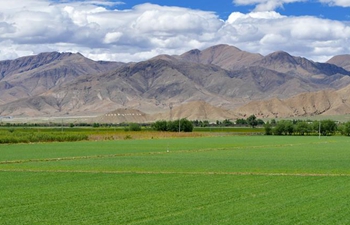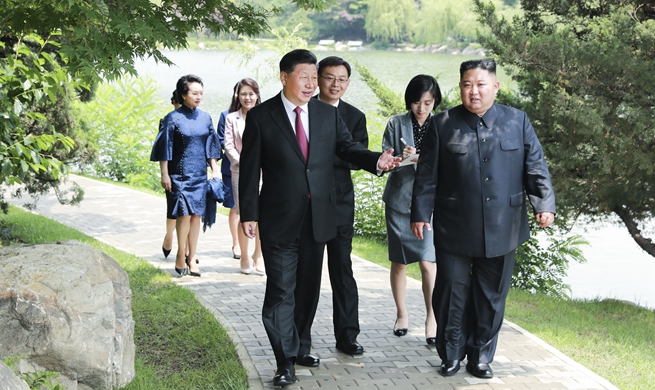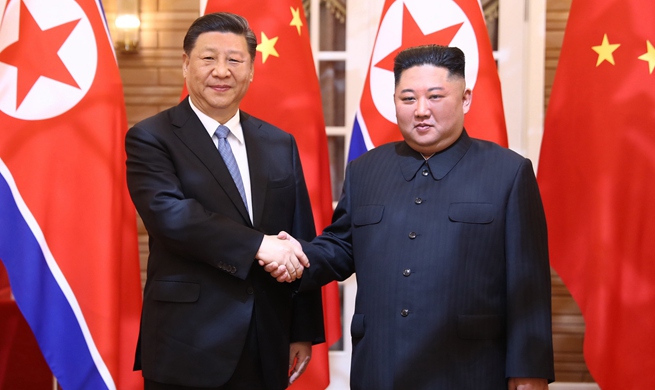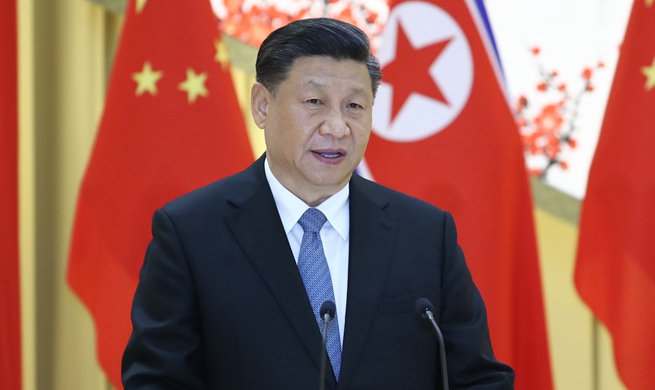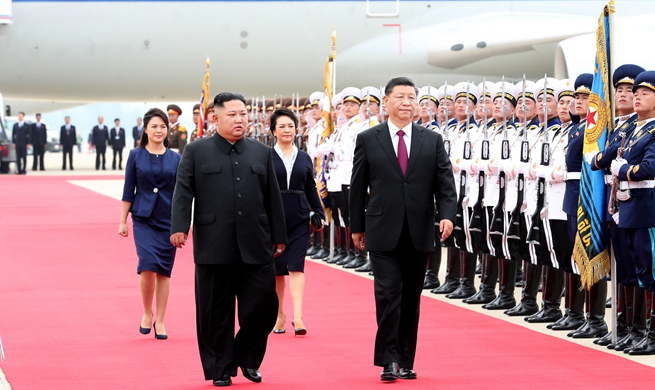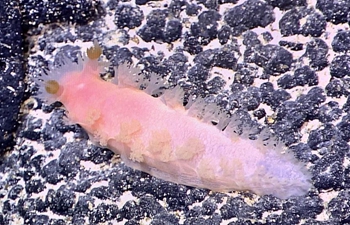ISTANBUL, June 23 (Xinhua) -- As Turkey's row with Greek Cypriots over offshore energy reserves escalates amid the EU's threatened sanctions against Ankara, the tension should be expected to persist without turning into a hot conflict, though making the reunification of the divided island less likely, analysts told Xinhua.
"The escalation of the issue is, in fact, the death sentence of the 'federal solution' for Cyprus," said Faruk Logoglu, a former senior diplomat.
Turkey sent Thursday a second vessel to the eastern Mediterranean to search for hydrocarbon reserves in response to drilling by the Greek Cypriot government.
The EU, of which the Republic of Cyprus representing the Greek Cypriots only and Greece are members, called on Ankara to stop its "illegal" drilling activities.
"Turkey must now work for the entrenchment of the Turkish Republic of Northern Cyprus and its wider recognition globally," Logoglu said, noting the Greek side acts as if it has exclusive rights and say over Cyprus.
Cyprus was split along ethnic lines in 1974, when Turkey intervened militarily following a military coup by Athens-backed Greek Cypriots.
Ankara's drilling move came after the Greek Cypriot government, which is recognized internationally, concluded deals last year with some big energy firms for drilling off Cyprus.
Ankara says some of the gas fields claimed by the Greek Cypriots overlap with the exclusive economic zone of Turkey and the Turkish Cypriots who live in the northern part of the Cyprus island.
Top Turkish officials have repeatedly said Ankara would resolutely protect the Turkish Cypriots' rights, underlining that the Turkish community should also have its share of the riches under the sea bed.
The self-declared Turkish Republic of Northern Cyprus, not recognized by any country other than Turkey, announced earlier this week that it would prepare an inventory of all assets and movable properties in the ghost town of Varosha.
Once a lively coastal resort in eastern Cyprus, Varosha has been closed and uninhabited since Turkey's military intervention.
In earlier negotiations over the reunification of the island, Ankara was ready to offer the town to the Greek Cypriots in return for a satisfactory federal settlement on the island.
The Varosha step and the Turkish drilling off Cyprus are what the Turkish side will do unless a deal on exclusive economic zones is reached between the Turkish and Greek sides, said Celalettin Yavuz, a security and foreign policy analyst.
These moves suggest that Turkey and the Turkish Cypriots have started to favor a two-state solution on the island, Yavuz noted, adding the moves may have been actually intended more to boost the Turkish side's bargaining power.
The EU leaders met in Brussels on Thursday and tasked the European Commission, the executive of the 28-nation bloc, with proposing measures against Ankara.
"We'll do so, and these will not be soft measures," said Jean-Claude Juncker, president of the European Commission.
"The EU does not really have too many instruments in hand to use as sanctions," Logoglu argued, noting the EU has long been reluctant to meet Turkish demands.
Turkey's EU accession negotiations have long been stalled, and there is no sign of progress for any upgrade in the Customs Union Agreement between Ankara and Brussels or for visa-free travel for Turkish citizens, for which Ankara has long been pushing for.
The only unpalatable option is that the EU may end funds for Syrian refugees in Turkey, Logoglu remarked.
In such a case, however, Turkey would no longer feel obliged to honor the refuge deal with the EU in line with which it has so far successfully blocked irregular migration to Europe, a nightmare scenario for EU capitals.
In contrast to Logoglu, Yavuz, who teaches at Istanbul Ayvansaray University, thinks the EU may take some steps that would economically hurt the already ailing Turkish economy.
"The EU may increase tariffs on some goods such as textile and agricultural products it imports from Turkey," Yavuz said.
Brussels may also partly or totally suspend the Customs Union Agreement, depending on any escalation in the ongoing crisis, he added.
Ankara already faces the threat of sanctions from the U.S., which also sides with Nicosia in the gas dispute, unless it gives up buying the S-400 air defense system from Russia.
"Turkey must continue its drilling activities with quiet determination, but at the same time launch a sustained diplomatic offensive to explain and project its views," remarked Logoglu.
He feels that as a first step in this direction, Ankara must mend its relations with Syria, Egypt and Israel in search of agreements on joint exploration activities.
Turkey is highly isolated in the region due to its sour relations with nearly all the countries in the eastern Mediterranean.
Ankara has little chance of finding support against the EU bloc given that its ties with the U.S., Israel and many Arab countries are problematic as well, observed Yavuz.
"Given Turkey's isolation, it is highly unlikely for the Greek side to agree to share any energy reserves," he said.
In response to the Greek Cypriots' drilling off southern Cyprus, Turkey's first drilling vessel, the Fatih, started to operate off the western part of the island at the beginning of May.
When the Greek Cypriots issued arrest warrants against Fatih's crew members about two weeks ago for alleged infringement on their exclusive economic zone, Ankara warned Nicosia against such a step.
Turkish President Recep Tayyip Erdogan said Turkish fighter jets were also ready to protect Fatih, which is already being escorted by several navy ships.
Ankara disputes Nicosia's maritime boundary claims, saying its drilling vessels operate within its own continental shelf area.
"Turkey must also get in touch with international oil companies with attractive offers of joint undertakings," Logoglu said.
Neither of the analysts expects the crisis to escalate into an armed confrontation between Turkey and the Greek side.
"While the tension in the eastern Mediterranean is likely to persist, the situation morphing into a military confrontation is unlikely," said Logoglu.
Turkey would continue drilling depending on its own military power, but would not attempt to stop the Greek Cypriots' drilling activity either, remarked Yavuz.
The EU would not favor a military confrontation with Turkey either, as it would not wish to totally alienate Ankara which then could break away from the West, he argued.

